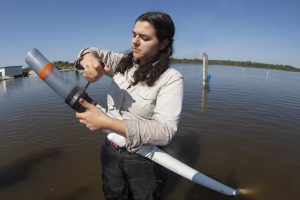Microorganisms are the oldest and most essential life forms on Earth. Microbes exist everywhere, even in the most extreme environments, and without them, our planet wouldn’t survive. Environmental microbiology is the study of microbial function, composition, and interaction within terrestrial, air, aquatic, marine, and extraterrestrial environments.

Environmental microbiologists help solve some of the planet’s biggest problems while studying the smallest creatures. Professors at the University of Florida’s Department of Microbiology and Cell Science use a combination of laboratory and field science to explore the geomicrobiology of retreating ice sheets, investigate agriculture-altering citrus greening disease, and examine host-microbe interactions in microgravity.
Expertise in environmental microbiology can lead to careers in agriculture, water management, space exploration, ocean clean-up, and conservation science among others.
Environmental Microbiology Graduate Certificate
The University of Florida Department of Microbiology and Cell Science offers a fully online graduate certificate in Environmental Microbiology designed for people who want to make an impact on global issues by studying the microscopic world. While the world focuses on the effects of climate change, we need experts who understand the planet’s complex microbiomes. You will study concepts like microbial ecology, biogeochemistry, and astrobiology by exploring marine microbial ecology, studying the ecological significance of toxic organic chemicals, examining the origin and future of life in our solar system, and much more. Below are a sample of classes offered through this certificate:
Environmental Microbiology
The Environmental Microbiology course covers four key areas: introduction to environmental microbiology and current methodologies, microbial diversity and the species concept, marine microbial ecology, host-microbe interactions, and future frontiers of environmental microbiology.
Astrobiology
The Astrobiology course examines the origin, evolution, and future of life in our solar system. Topics will include planet and star formation, biosphere formation, evolutionary processes biogeochemistry, microbial adaptation to extreme environments, planetary habitability, and microbiology on the International Space Station.
Soil Microbial Ecology
The Soil Microbial Ecology course intends to teach students about soil as a microbial habitat, the diversity of the soil ecosystem, symbiotic interactions, and the role of soil microorganisms in biogeochemical cycles. Students will analyze the physiological basis for microbial activities in soil and translate those to ecological interactions and processes, discuss the fundamental physiology and ecology underlying many of the important biogeochemical cycles in soils, including carbon, nitrogen, and sulfur cycles, and identify the appropriate methods for addressing fundamental questions in soil microbial ecology.
Biodegradation and Bioremediation of Organic Contaminants
The Biodegradation and Bioremediation course presents the basic principles of chemical and biological degradation of toxic chemicals and familiarizes students with the application of bioremedial technologies in natural environments. Students gain knowledge of microbial degradation strategies, the biotransformation of chemicals, and the bioremediation of pollutants.
 3
3
